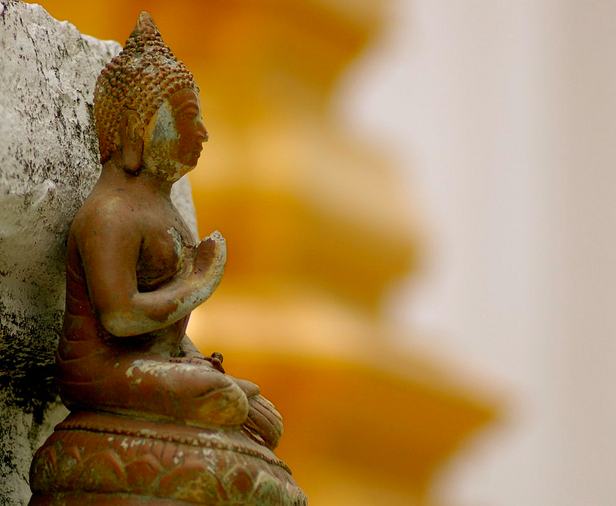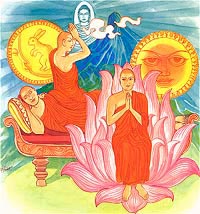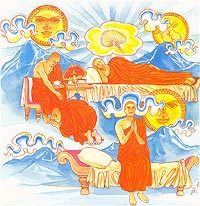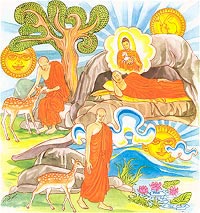through
http://sarvajan.ambedkar.org
sabbe satta bhavantu sukhi-tatta
TIPITAKA
TIPITAKA AND TWELVE DIVISIONS
Brief historical background
Sutta Pitaka
Vinaya Pitaka
Abhidhamma Pitaka
Twelve Divisions of Buddhist Canons
Nine Divisions of Buddhist Canons
Sutta Piṭaka
— The basket of discourses —Mahāsatipaṭṭhāna Sutta (DN 22) {excerpt} - all infobubbles— Attendance on awareness —Kāyānupassanā
IV. சட்டத்துக்கு அடிப்படையான அற முறைகளின் கூர்ந்த கவனிப்பு
E2. Samudayasacca சமுதயசத்தியத்தை விளக்கிக்காட்டுதல்
Dhammapada Dhammapada Verses 296 to 301 Darusakatikaputta Vatthu-Verse 296. Reflect On The Virtues Of The Buddha-Verse 297. Reflect On The Virtues Of The Dhamma-Verse 298. Reflect On The Virtues Of The Sangha-Verse 299. Reflect On The Real Nature of the Body-Verse 300. Reflect On Harmlessness-Verse 301. The Mind That Takes Delight in Meditation
ABOUT AWAKEN ONES WITH AWARENESS China
See also: List of Buddhist architecture in China
Anhui
• Huacheng Temple
August 15 is not a national holiday?
This sutta is widely considered as a the main reference for meditation practice.
| E2. Samudayasacca Niddesa
Katamaṃ ca, bhikkhave, dukkha·samudayaṃ ariya·saccaṃ? Y·āyaṃ taṇhā ponobbhavikā nandi·rāga·sahagatā tatra·tatr·ābhinandinī, seyyathidaṃ: kāma-taṇhā, bhava-taṇhā, vibhava-taṇhā. Sā kho pan·esā, bhikkhave, taṇhā kattha uppajjamānā uppajjati, kattha nivisamānā nivisati? Yaṃ loke piya·rūpaṃ sāta·rūpaṃ etthesā taṇhā uppajjamānā uppajjati, ettha nivisamānā nivisati. |
E2. Exposition of Samudayasacca
And what, bhikkhus, is the dukkha-samudaya ariyasacca? It is this taṇhā leading to rebirth, connected with desire and enjoyment, finding delight here or there, that is to say: kāma-taṇhā, bhava-taṇhā and vibhava-taṇhā. But this taṇhā, |
|||||||||||||||||||||||
|
Kiñca loke piya·rūpaṃ sāta·rūpaṃ? Cakkhu loke piya·rūpaṃ sāta·rūpaṃ etthesā taṇhā uppajjamānā uppajjati, ettha nivisamānā nivisati. Sotaṃ loke piya·rūpaṃ sāta·rūpaṃ etthesā taṇhā uppajjamānā uppajjati, ettha nivisamānā nivisati. Ghānaṃ loke piya·rūpaṃ sāta·rūpaṃ etthesā taṇhā uppajjamānā uppajjati, ettha nivisamānā nivisati. Jivhā loke piya·rūpaṃ sāta·rūpaṃ etthesā taṇhā uppajjamānā uppajjati, ettha nivisamānā nivisati. Kayo loke piya·rūpaṃ sāta·rūpaṃ etthesā taṇhā uppajjamānā uppajjati, ettha nivisamānā nivisati. Mano loke piya·rūpaṃ sāta·rūpaṃ etthesā taṇhā uppajjamānā uppajjati, ettha nivisamānā nivisati. |
And what in the world is pleasant and agreeable? The eye in the world is pleasant and agreeable, there taṇhā, when arising, arises, there when settling, it settles. The ear in the world is pleasant and agreeable, there taṇhā, when arising, arises, there when settling, it settles. The nose in the world is pleasant and agreeable, there taṇhā, when arising, arises, there when settling, it settles. The tongue in the world is pleasant and agreeable, there taṇhā, when arising, arises, there when settling, it settles. Kāya in the world is pleasant and agreeable, there taṇhā, when arising, arises, there when settling, it settles. Mana in the world is pleasant and agreeable, there taṇhā, when arising, arises, there when settling, it settles. |
|||||||||||||||||||||||
|
Rūpā loke piya·rūpaṃ sāta·rūpaṃ etthesā taṇhā uppajjamānā uppajjati, ettha nivisamānā nivisati. Saddā loke piya·rūpaṃ sāta·rūpaṃ etthesā taṇhā uppajjamānā uppajjati, ettha nivisamānā nivisati. Gandhā loke piya·rūpaṃ sāta·rūpaṃ etthesā taṇhā uppajjamānā uppajjati, ettha nivisamānā nivisati. Rasā loke piya·rūpaṃ sāta·rūpaṃ etthesā taṇhā uppajjamānā uppajjati, ettha nivisamānā nivisati. Phoṭṭhabbā loke piya·rūpaṃ sāta·rūpaṃ etthesā taṇhā uppajjamānā uppajjati, ettha nivisamānā nivisati. Dhammā loke piya·rūpaṃ sāta·rūpaṃ etthesā taṇhā uppajjamānā uppajjati, ettha nivisamānā nivisati. |
Visible forms in the world are pleasant and agreeable, there taṇhā, when arising, arises, there when settling, it settles. Sounds in the world are pleasant and agreeable, there taṇhā, when arising, arises, there when settling, it settles. Smells in the world are pleasant and agreeable, there taṇhā, when arising, arises, there when settling, it settles. Tastes in the world are pleasant and agreeable, there taṇhā, when arising, arises, there when settling, it settles. Bodily phenomena in the world are pleasant and agreeable, there taṇhā, when arising, arises, there when settling, it settles. Dhammas in the world are pleasant and agreeable, there taṇhā, when arising, arises, there when settling, it settles. தமிழ்
கண்ணுக்கு தெரிகிற படிவங்கள் இந்த உலகத்தினுள்ளே எவை மகிழ்வளிக்கிற மற்றும் ஒத்துக்கொள்கிறதாகக் காணப்படுகிறதோ, அங்கே தான் taṇhā அடக்க முடியாத ஆசை/இச்சை/தாகம்/தகாச் சிற்றின்பவேட்கை, எழும்பும் நேரத்தில், அது எங்கே யெழும்புகிறது, தானே நிலைகொள்கிற நேரத்தில், அது எங்கே நிலைகொள்கிறது. ஒலிகள், இந்த உலகத்தினுள்ளே எவை மகிழ்வளிக்கிற மற்றும் ஒத்துக்கொள்கிறதாகக் காணப்படுகிறதோ, அங்கே தான் taṇhā அடக்க முடியாத ஆசை/இச்சை/தாகம்/தகாச் சிற்றின்பவேட்கை, எழும்பும் நேரத்தில், அது எங்கே யெழும்புகிறது, தானே நிலைகொள்கிற நேரத்தில், அது எங்கே நிலைகொள்கிறது. வாசனைகள், இந்த உலகத்தினுள்ளே எவை மகிழ்வளிக்கிற மற்றும் ஒத்துக்கொள்கிறதாகக் காணப்படுகிறதோ, அங்கே தான் taṇhā அடக்க முடியாத ஆசை/இச்சை/தாகம்/தகாச் சிற்றின்பவேட்கை, எழும்பும் நேரத்தில், அது எங்கே யெழும்புகிறது, தானே நிலைகொள்கிற நேரத்தில், அது எங்கே நிலைகொள்கிறது. சுவைகள் இந்த உலகத்தினுள்ளே எவை மகிழ்வளிக்கிற மற்றும் ஒத்துக்கொள்கிறதாகக் காணப்படுகிறதோ, அங்கே தான் taṇhā அடக்க முடியாத ஆசை/இச்சை/தாகம்/தகாச் சிற்றின்பவேட்கை, எழும்பும் நேரத்தில், அது எங்கே யெழும்புகிறது, தானே நிலைகொள்கிற நேரத்தில், அது எங்கே நிலைகொள்கிறது. |
|||||||||||||||||||||||
|
Cakkhu·viññāṇaṃ loke piya·rūpaṃ sāta·rūpaṃ etthesā taṇhā uppajjamānā uppajjati, ettha nivisamānā nivisati. Sota·viññāṇaṃ loke piya·rūpaṃ sāta·rūpaṃ etthesā taṇhā uppajjamānā uppajjati, ettha nivisamānā nivisati. Ghāna·viññāṇaṃ loke piya·rūpaṃ sāta·rūpaṃ etthesā taṇhā uppajjamānā uppajjati, ettha nivisamānā nivisati. Jivhā·viññāṇaṃ loke piya·rūpaṃ sāta·rūpaṃ etthesā taṇhā uppajjamānā uppajjati, ettha nivisamānā nivisati. Kāya·viññāṇaṃ loke piya·rūpaṃ sāta·rūpaṃ etthesā taṇhā uppajjamānā uppajjati, ettha nivisamānā nivisati. Mano·viññāṇaṃ loke piya·rūpaṃ sāta·rūpaṃ etthesā taṇhā uppajjamānā uppajjati, ettha nivisamānā nivisati. |
The eye-viññāṇa in the world is pleasant and agreeable, there taṇhā, when arising, arises, there when settling, it settles. The ear-viññāṇa in the world is pleasant and agreeable, there taṇhā, when arising, arises, there when settling, it settles. The nose-viññāṇa in the world is pleasant and agreeable, there taṇhā, when arising, arises, there when settling, it settles. The tongue-viññāṇa in the world is pleasant and agreeable, there taṇhā, when arising, arises, there when settling, it settles. Kāya-viññāṇa in the world is pleasant and agreeable, there taṇhā, when arising, arises, there when settling, it settles. Mana-viññāṇa in the world is pleasant and agreeable, there taṇhā, when arising, arises, there when settling, it settles.
இந்த eye-viññāṇa கண்-விழிப்புணர்வுநிலை இந்த
|
|||||||||||||||||||||||
|
Cakkhu·samphasso loke piya·rūpaṃ sāta·rūpaṃ etthesā taṇhā uppajjamānā uppajjati, ettha nivisamānā nivisati. Sota·samphasso loke piya·rūpaṃ sāta·rūpaṃ etthesā taṇhā uppajjamānā uppajjati, ettha nivisamānā nivisati. Ghāna·samphasso loke piya·rūpaṃ sāta·rūpaṃ etthesā taṇhā uppajjamānā uppajjati, ettha nivisamānā nivisati. Jivhā·samphasso loke piya·rūpaṃ sāta·rūpaṃ etthesā taṇhā uppajjamānā uppajjati, ettha nivisamānā nivisati. Kāya·samphasso loke piya·rūpaṃ sāta·rūpaṃ etthesā taṇhā uppajjamānā uppajjati, ettha nivisamānā nivisati. Mano·samphasso loke piya·rūpaṃ sāta·rūpaṃ etthesā taṇhā uppajjamānā uppajjati, ettha nivisamānā nivisati. |
The eye-samphassa in the world is pleasant and agreeable, there taṇhā, when arising, arises, there when settling, it settles. The ear-samphassa in the world is pleasant and agreeable, there taṇhā, when arising, arises, there when settling, it settles. The nose-samphassa in the world is pleasant and agreeable, there taṇhā, when arising, arises, there when settling, it settles. The tongue-samphassa in the world is pleasant and agreeable, there taṇhā, when arising, arises, there when settling, it settles. Kāya-samphassa in the world is pleasant and agreeable, there taṇhā, when arising, arises, there when settling, it settles. Mana-samphassa in the world is pleasant and agreeable, there taṇhā, when arising, arises, there when settling, it settles. இந்த eye-samphassa கண்-தொடர்பு இந்த உலகத்தினுள்ளே எவை மகிழ்வளிக்கிற மற்றும் ஒத்துக்கொள்கிறதாகக் காணப்படுகிறதோ, அங்கே தான் taṇhā அடக்க முடியாத ஆசை/இச்சை/தாகம்/தகாச் சிற்றின்பவேட்கை, எழும்பும் நேரத்தில், அது எங்கே யெழும்புகிறது, தானே நிலைகொள்கிற நேரத்தில், அது எங்கே நிலைகொள்கிறது.இந்த ear-samphassa காது-தொடர்பு இந்த உலகத்தினுள்ளே எவை மகிழ்வளிக்கிற மற்றும் ஒத்துக்கொள்கிறதாகக் காணப்படுகிறதோ, அங்கே தான் taṇhā அடக்க முடியாத ஆசை/இச்சை/தாகம்/தகாச் சிற்றின்பவேட்கை, எழும்பும் நேரத்தில், அது எங்கே யெழும்புகிறது, தானே நிலைகொள்கிற நேரத்தில், அது எங்கே நிலைகொள்கிறது.இந்த nose-samphassa மூக்கு-தொடர்பு இந்த உலகத்தினுள்ளே எவை மகிழ்வளிக்கிற மற்றும் ஒத்துக்கொள்கிறதாகக் காணப்படுகிறதோ, அங்கே தான் taṇhā அடக்க முடியாத ஆசை/இச்சை/தாகம்/தகாச் சிற்றின்பவேட்கை, எழும்பும் நேரத்தில், அது எங்கே யெழும்புகிறது, தானே நிலைகொள்கிற நேரத்தில், அது எங்கே நிலைகொள்கிறது. இந்த tongue-samphassa நாக்கு-தொடர்பு இந்த உலகத்தினுள்ளே எவை மகிழ்வளிக்கிற மற்றும் ஒத்துக்கொள்கிறதாகக் காணப்படுகிறதோ, அங்கே தான் taṇhā அடக்க முடியாத ஆசை/இச்சை/தாகம்/தகாச் சிற்றின்பவேட்கை, எழும்பும் நேரத்தில், அது எங்கே யெழும்புகிறது, தானே நிலைகொள்கிற நேரத்தில், அது எங்கே நிலைகொள்கிறது. இந்த Kāyaகாயம் -samphassa உடம்பு-தொடர்பு இந்த உலகத்தினுள்ளே எவை மகிழ்வளிக்கிற மற்றும் ஒத்துக்கொள்கிறதாகக் காணப்படுகிறதோ, அங்கே தான் taṇhā அடக்க முடியாத ஆசை/இச்சை/தாகம்/தகாச் சிற்றின்பவேட்கை, எழும்பும் நேரத்தில், அது எங்கே யெழும்புகிறது, தானே நிலைகொள்கிற நேரத்தில், அது எங்கே நிலைகொள்கிறது. |
|||||||||||||||||||||||
|
Cakkhu·samphassa·jā vedanā loke piya·rūpaṃ sāta·rūpaṃ etthesā taṇhā uppajjamānā uppajjati, ettha nivisamānā nivisati. Sota·samphassa·jā vedanā loke piya·rūpaṃ sāta·rūpaṃ etthesā taṇhā uppajjamānā uppajjati, ettha nivisamānā nivisati. Ghāna·samphassa·jā vedanā loke piya·rūpaṃ sāta·rūpaṃ etthesā taṇhā uppajjamānā uppajjati, ettha nivisamānā nivisati. Jivhā·samphassa·jā vedanā loke piya·rūpaṃ sāta·rūpaṃ etthesā taṇhā uppajjamānā uppajjati, ettha nivisamānā nivisati. Kāya·samphassa·jā vedanā loke piya·rūpaṃ sāta·rūpaṃ etthesā taṇhā uppajjamānā uppajjati, ettha nivisamānā nivisati. Mano·samphassa·jā vedanā loke piya·rūpaṃ sāta·rūpaṃ etthesā taṇhā uppajjamānā uppajjati, ettha nivisamānā nivisati. |
The vedanā born of eye-samphassa in the world is pleasant and agreeable, there taṇhā, when arising, arises, there when settling, it settles. The vedanā born of ear-samphassa in the world is pleasant and agreeable, there taṇhā, when arising, arises, there when settling, it settles. The vedanā born of nose-samphassa in the world is pleasant and agreeable, there taṇhā, when arising, arises, there when settling, it settles. The vedanā born of tongue-samphassa in the world is pleasant and agreeable, there taṇhā, when arising, arises, there when settling, it settles. The vedanā born of kāya-samphassa in the world is pleasant and agreeable, there taṇhā, when arising, arises, there when settling, it settles. The vedanā born of mana-samphassa in the world is pleasant and agreeable, there taṇhā, when arising, arises, there when settling, it settles. The vedanāவேதனையால் பிறந்த இந்த eye-samphassa கண்-தொடர்பு இந்த உலகத்தினுள்ளே எவை மகிழ்வளிக்கிற மற்றும் ஒத்துக்கொள்கிறதாகக் காணப்படுகிறதோ, அங்கே தான் taṇhā அடக்க முடியாத ஆசை/இச்சை/தாகம்/தகாச் சிற்றின்பவேட்கை, எழும்பும் நேரத்தில், அது எங்கே யெழும்புகிறது, தானே நிலைகொள்கிற நேரத்தில், அது எங்கே நிலைகொள்கிறது.இந்த ear-samphassa காது-தொடர்பு இந்த உலகத்தினுள்ளே எவை மகிழ்வளிக்கிற மற்றும் ஒத்துக்கொள்கிறதாகக் காணப்படுகிறதோ, அங்கே தான் taṇhā அடக்க முடியாத ஆசை/இச்சை/தாகம்/தகாச் சிற்றின்பவேட்கை, எழும்பும் நேரத்தில், அது எங்கே யெழும்புகிறது, தானே நிலைகொள்கிற நேரத்தில், அது எங்கே நிலைகொள்கிறது.இந்த nose-samphassa மூக்கு-தொடர்பு இந்த உலகத்தினுள்ளே எவை மகிழ்வளிக்கிற மற்றும் ஒத்துக்கொள்கிறதாகக் காணப்படுகிறதோ, அங்கே தான் taṇhā அடக்க முடியாத ஆசை/இச்சை/தாகம்/தகாச் சிற்றின்பவேட்கை, எழும்பும் நேரத்தில், அது எங்கே யெழும்புகிறது, தானே நிலைகொள்கிற நேரத்தில், அது எங்கே நிலைகொள்கிறது. இந்த tongue-samphassa நாக்கு-தொடர்பு இந்த உலகத்தினுள்ளே எவை மகிழ்வளிக்கிற மற்றும் ஒத்துக்கொள்கிறதாகக் காணப்படுகிறதோ, அங்கே தான் taṇhā அடக்க முடியாத ஆசை/இச்சை/தாகம்/தகாச் சிற்றின்பவேட்கை, எழும்பும் நேரத்தில், அது எங்கே யெழும்புகிறது, தானே நிலைகொள்கிற நேரத்தில், அது எங்கே நிலைகொள்கிறது. |
|||||||||||||||||||||||
|
Rūpā·saññā loke piya·rūpaṃ sāta·rūpaṃ etthesā taṇhā uppajjamānā uppajjati, ettha nivisamānā nivisati. Sadda·saññā loke piya·rūpaṃ sāta·rūpaṃ etthesā taṇhā uppajjamānā uppajjati, ettha nivisamānā nivisati. Gandha·saññā loke piya·rūpaṃ sāta·rūpaṃ etthesā taṇhā uppajjamānā uppajjati, ettha nivisamānā nivisati. Rasa·saññā loke piya·rūpaṃ sāta·rūpaṃ etthesā taṇhā uppajjamānā uppajjati, ettha nivisamānā nivisati. Phoṭṭhabba·saññā loke piya·rūpaṃ sāta·rūpaṃ etthesā taṇhā uppajjamānā uppajjati, ettha nivisamānā nivisati. Dhamma·saññā loke piya·rūpaṃ sāta·rūpaṃ etthesā taṇhā uppajjamānā uppajjati, ettha nivisamānā nivisati. |
The saññā of visible forms in the world is pleasant and agreeable, there taṇhā, when arising, arises, there when settling, it settles. The saññā of sounds in the world is pleasant and agreeable, there taṇhā, when arising, arises, there when settling, it settles. The saññā of smells in the world is pleasant and agreeable, there taṇhā, when arising, arises, there when settling, it settles. The saññā of tastes in the world is pleasant and agreeable, there taṇhā, when arising, arises, there when settling, it settles. The saññā of bodily phenomena in the world is pleasant and agreeable, there taṇhā, when arising, arises, there when settling, it settles. The saññā of Dhammas in the world is pleasant and agreeable, there taṇhā, when arising, arises, there when settling, it settles. இந்த saññā புலனுணர்வு கண்ணுக்கு தெரிகிற படிவங்கள் இந்த உலகத்தினுள்ளே எவை மகிழ்வளிக்கிற மற்றும் ஒத்துக்கொள்கிறதாகக் காணப்படுகிறதோ, அங்கே தான் taṇhā அடக்க முடியாத ஆசை/இச்சை/தாகம்/தகாச் சிற்றின்பவேட்கை, எழும்பும் நேரத்தில், அது எங்கே யெழும்புகிறது, தானே நிலைகொள்கிற நேரத்தில், அது எங்கே நிலைகொள்கிறது. saññā புலனுணர்வு ஒலிகள், இந்த உலகத்தினுள்ளே எவை மகிழ்வளிக்கிற மற்றும் ஒத்துக்கொள்கிறதாகக் காணப்படுகிறதோ, அங்கே தான் taṇhā அடக்க முடியாத ஆசை/இச்சை/தாகம்/தகாச் சிற்றின்பவேட்கை, எழும்பும் நேரத்தில், அது எங்கே யெழும்புகிறது, தானே நிலைகொள்கிற நேரத்தில், அது எங்கே நிலைகொள்கிறது. saññā புலனுணர்வு வாசனைகள், இந்த உலகத்தினுள்ளே எவை மகிழ்வளிக்கிற மற்றும் ஒத்துக்கொள்கிறதாகக் காணப்படுகிறதோ, அங்கே தான் taṇhā அடக்க முடியாத ஆசை/இச்சை/தாகம்/தகாச் சிற்றின்பவேட்கை, எழும்பும் நேரத்தில், அது எங்கே யெழும்புகிறது, தானே நிலைகொள்கிற நேரத்தில், அது எங்கே நிலைகொள்கிறது. saññā புலனுணர்வு சுவைகள் இந்த உலகத்தினுள்ளே எவை மகிழ்வளிக்கிற மற்றும் ஒத்துக்கொள்கிறதாகக் காணப்படுகிறதோ, அங்கே தான் taṇhā அடக்க முடியாத ஆசை/இச்சை/தாகம்/தகாச் சிற்றின்பவேட்கை, எழும்பும் நேரத்தில், அது எங்கே யெழும்புகிறது, தானே நிலைகொள்கிற நேரத்தில், அது எங்கே நிலைகொள்கிறது. |
|||||||||||||||||||||||
|
Rūpā·sañcetanā loke piya·rūpaṃ sāta·rūpaṃ etthesā taṇhā uppajjamānā uppajjati, ettha nivisamānā nivisati. Sadda·sañcetanā loke piya·rūpaṃ sāta·rūpaṃ etthesā taṇhā uppajjamānā uppajjati, ettha nivisamānā nivisati. Gandha·sañcetanā loke piya·rūpaṃ sāta·rūpaṃ etthesā taṇhā uppajjamānā uppajjati, ettha nivisamānā nivisati. Rasa·sañcetanā loke piya·rūpaṃ sāta·rūpaṃ etthesā taṇhā uppajjamānā uppajjati, ettha nivisamānā nivisati. Phoṭṭhabba·sañcetanā loke piya·rūpaṃ sāta·rūpaṃ etthesā taṇhā uppajjamānā uppajjati, ettha nivisamānā nivisati. Dhamma·sañcetanā loke piya·rūpaṃ sāta·rūpaṃ etthesā taṇhā uppajjamānā uppajjati, ettha nivisamānā nivisati. |
The intention [related to] visible forms in the world is pleasant and agreeable, there taṇhā, இந்த புலனுணர்வு தொகுத்த பொதுக் கருத்துப்படிவம் தொடர்புடைய கண்ணுக்கு தெரிகிற படிவங்கள் இந்த உலகத்தினுள்ளே எவை மகிழ்வளிக்கிற மற்றும் ஒத்துக்கொள்கிறதாகக் காணப்படுகிறதோ, அங்கே தான் taṇhā அடக்க முடியாத ஆசை/இச்சை/தாகம்/தகாச் சிற்றின்பவேட்கை, எழும்பும் நேரத்தில், அது எங்கே யெழும்புகிறது, தானே நிலைகொள்கிற நேரத்தில், அது எங்கே நிலைகொள்கிறது. ஒலிகள், இந்த உலகத்தினுள்ளே எவை மகிழ்வளிக்கிற மற்றும் ஒத்துக்கொள்கிறதாகக் காணப்படுகிறதோ, அங்கே தான் taṇhā அடக்க முடியாத ஆசை/இச்சை/தாகம்/தகாச் சிற்றின்பவேட்கை, எழும்பும் நேரத்தில், அது எங்கே யெழும்புகிறது, தானே நிலைகொள்கிற நேரத்தில், அது எங்கே நிலைகொள்கிறது. வாசனைகள், இந்த உலகத்தினுள்ளே எவை மகிழ்வளிக்கிற மற்றும் ஒத்துக்கொள்கிறதாகக் காணப்படுகிறதோ, அங்கே தான் taṇhā அடக்க முடியாத ஆசை/இச்சை/தாகம்/தகாச் சிற்றின்பவேட்கை, எழும்பும் நேரத்தில், அது எங்கே யெழும்புகிறது, தானே நிலைகொள்கிற நேரத்தில், அது எங்கே நிலைகொள்கிறது. சுவைகள் இந்த உலகத்தினுள்ளே எவை மகிழ்வளிக்கிற மற்றும் ஒத்துக்கொள்கிறதாகக் காணப்படுகிறதோ, அங்கே தான் taṇhā அடக்க முடியாத ஆசை/இச்சை/தாகம்/தகாச் சிற்றின்பவேட்கை, எழும்பும் நேரத்தில், அது எங்கே யெழும்புகிறது, தானே நிலைகொள்கிற நேரத்தில், அது எங்கே நிலைகொள்கிறது. |
|||||||||||||||||||||||
|
Rūpā·taṇhā loke piya·rūpaṃ sāta·rūpaṃ etthesā taṇhā uppajjamānā uppajjati, ettha nivisamānā nivisati. Sadda·taṇhā loke piya·rūpaṃ sāta·rūpaṃ etthesā taṇhā uppajjamānā uppajjati, ettha nivisamānā nivisati. Gandha·taṇhā loke piya·rūpaṃ sāta·rūpaṃ etthesā taṇhā uppajjamānā uppajjati, ettha nivisamānā nivisati. Rasa·taṇhā loke piya·rūpaṃ sāta·rūpaṃ etthesā taṇhā uppajjamānā uppajjati, ettha nivisamānā nivisati. Phoṭṭhabba·taṇhā loke piya·rūpaṃ sāta·rūpaṃ etthesā taṇhā uppajjamānā uppajjati, ettha nivisamānā nivisati. Dhamma·taṇhā loke piya·rūpaṃ sāta·rūpaṃ etthesā taṇhā uppajjamānā uppajjati, ettha nivisamānā nivisati. |
The taṇhā for visible forms in the world is pleasant and agreeable, there taṇhā, when arising, arises, there when settling, it settles. The taṇhā for sounds in the world is pleasant and agreeable, there taṇhā, when arising, arises, there when settling, it settles. The taṇhā for smells in the world is pleasant and agreeable, there taṇhā, when arising, arises, there when settling, it settles. The taṇhā for tastes in the world is pleasant and agreeable, there taṇhā, when arising, arises, there when settling, it settles. The taṇhā for bodily phenomena in the world is pleasant and agreeable, there taṇhā, when arising, arises, there when settling, it settles. The taṇhā for dhammas in the world is pleasant and agreeable, there taṇhā, when arising, arises, there when settling, it settles. இந்த taṇhā அடக்க முடியாத ஆசை/இச்சை/தாகம்/தகாச் சிற்றின்பவேட்கை, கண்ணுக்கு தெரிகிற படிவங்கள் இந்த உலகத்தினுள்ளே எவை மகிழ்வளிக்கிற மற்றும் ஒத்துக்கொள்கிறதாகக் காணப்படுகிறதோ, அங்கே தான் taṇhā அடக்க முடியாத ஆசை/இச்சை/தாகம்/தகாச் சிற்றின்பவேட்கை, எழும்பும் நேரத்தில், அது எங்கே யெழும்புகிறது, தானே நிலைகொள்கிற நேரத்தில், அது எங்கே நிலைகொள்கிறது. ஒலிகள், இந்த உலகத்தினுள்ளே எவை மகிழ்வளிக்கிற மற்றும் ஒத்துக்கொள்கிறதாகக் காணப்படுகிறதோ, அங்கே தான் taṇhā அடக்க முடியாத ஆசை/இச்சை/தாகம்/தகாச் சிற்றின்பவேட்கை, எழும்பும் நேரத்தில், அது எங்கே யெழும்புகிறது, தானே நிலைகொள்கிற நேரத்தில், அது எங்கே நிலைகொள்கிறது. வாசனைகள், இந்த உலகத்தினுள்ளே எவை மகிழ்வளிக்கிற மற்றும் ஒத்துக்கொள்கிறதாகக் காணப்படுகிறதோ, அங்கே தான் taṇhā அடக்க முடியாத ஆசை/இச்சை/தாகம்/தகாச் சிற்றின்பவேட்கை, எழும்பும் நேரத்தில், அது எங்கே யெழும்புகிறது, தானே நிலைகொள்கிற நேரத்தில், அது எங்கே நிலைகொள்கிறது. சுவைகள் இந்த உலகத்தினுள்ளே எவை மகிழ்வளிக்கிற மற்றும் ஒத்துக்கொள்கிறதாகக் காணப்படுகிறதோ, அங்கே தான் taṇhā அடக்க முடியாத ஆசை/இச்சை/தாகம்/தகாச் சிற்றின்பவேட்கை, எழும்பும் நேரத்தில், அது எங்கே யெழும்புகிறது, தானே நிலைகொள்கிற நேரத்தில், அது எங்கே நிலைகொள்கிறது. |
|||||||||||||||||||||||
|
Rūpā·vitakko loke piya·rūpaṃ sāta·rūpaṃ etthesā taṇhā uppajjamānā uppajjati, ettha nivisamānā nivisati. Sadda·vitakko loke piya·rūpaṃ sāta·rūpaṃ etthesā taṇhā uppajjamānā uppajjati, ettha nivisamānā nivisati. Gandha·vitakko loke piya·rūpaṃ sāta·rūpaṃ etthesā taṇhā uppajjamānā uppajjati, ettha nivisamānā nivisati. Rasa·vitakko loke piya·rūpaṃ sāta·rūpaṃ etthesā taṇhā uppajjamānā uppajjati, ettha nivisamānā nivisati. Phoṭṭhabba·vitakko loke piya·rūpaṃ sāta·rūpaṃ etthesā taṇhā uppajjamānā uppajjati, ettha nivisamānā nivisati. Dhamma·vitakko loke piya·rūpaṃ sāta·rūpaṃ etthesā taṇhā uppajjamānā uppajjati, ettha nivisamānā nivisati. |
The vitakka of visible forms in the world is pleasant and agreeable, there taṇhā, when arising, arises, there when settling, it settles. The vitakka of sounds in the world is pleasant and agreeable, there taṇhā, when arising, arises, there when settling, it settles. The vitakka of smells in the world is pleasant and agreeable, there taṇhā, when arising, arises, there when settling, it settles. The vitakka of tastes in the world is pleasant and agreeable, there taṇhā, when arising, arises, there when settling, it settles. The vitakka of bodily phenomena in the world is pleasant and agreeable, there taṇhā, when arising, arises, there when settling, it settles. The vitakka of dhammas in the world is pleasant and agreeable, there taṇhā, when arising, arises, there when settling, it settles. இந்த vitakka எண்ணம்/எதிரொளி கண்ணுக்கு தெரிகிற படிவங்கள் இந்த உலகத்தினுள்ளே எவை மகிழ்வளிக்கிற மற்றும் ஒத்துக்கொள்கிறதாகக் காணப்படுகிறதோ, அங்கே தான் taṇhā அடக்க முடியாத ஆசை/இச்சை/தாகம்/தகாச் சிற்றின்பவேட்கை, எழும்பும் நேரத்தில், அது எங்கே யெழும்புகிறது, தானே நிலைகொள்கிற நேரத்தில், அது எங்கே நிலைகொள்கிறது. ஒலிகள், இந்த உலகத்தினுள்ளே எவை மகிழ்வளிக்கிற மற்றும் ஒத்துக்கொள்கிறதாகக் காணப்படுகிறதோ, அங்கே தான் taṇhā அடக்க முடியாத ஆசை/இச்சை/தாகம்/தகாச் சிற்றின்பவேட்கை, எழும்பும் நேரத்தில், அது எங்கே யெழும்புகிறது, தானே நிலைகொள்கிற நேரத்தில், அது எங்கே நிலைகொள்கிறது. வாசனைகள், இந்த உலகத்தினுள்ளே எவை மகிழ்வளிக்கிற மற்றும் ஒத்துக்கொள்கிறதாகக் காணப்படுகிறதோ, அங்கே தான் taṇhā அடக்க முடியாத ஆசை/இச்சை/தாகம்/தகாச் சிற்றின்பவேட்கை, எழும்பும் நேரத்தில், அது எங்கே யெழும்புகிறது, தானே நிலைகொள்கிற நேரத்தில், அது எங்கே நிலைகொள்கிறது. சுவைகள் இந்த உலகத்தினுள்ளே எவை மகிழ்வளிக்கிற மற்றும் ஒத்துக்கொள்கிறதாகக் காணப்படுகிறதோ, அங்கே தான் taṇhā அடக்க முடியாத ஆசை/இச்சை/தாகம்/தகாச் சிற்றின்பவேட்கை, எழும்பும் நேரத்தில், அது எங்கே யெழும்புகிறது, தானே நிலைகொள்கிற நேரத்தில், அது எங்கே நிலைகொள்கிறது. |
|||||||||||||||||||||||
|
Rūpā·vicāro loke piya·rūpaṃ sāta·rūpaṃ etthesā taṇhā uppajjamānā uppajjati, ettha nivisamānā nivisati. Sadda·vicāro loke piya·rūpaṃ sāta·rūpaṃ etthesā taṇhā uppajjamānā uppajjati, ettha nivisamānā nivisati. Gandha·vicāro loke piya·rūpaṃ sāta·rūpaṃ etthesā taṇhā uppajjamānā uppajjati, ettha nivisamānā nivisati. Rasa·vicāro loke piya·rūpaṃ sāta·rūpaṃ etthesā taṇhā uppajjamānā uppajjati, ettha nivisamānā nivisati. Phoṭṭhabba·vicāro loke piya·rūpaṃ sāta·rūpaṃ etthesā taṇhā uppajjamānā uppajjati, ettha nivisamānā nivisati. Dhamma·vicāro loke piya·rūpaṃ sāta·rūpaṃ etthesā taṇhā uppajjamānā uppajjati, ettha nivisamānā nivisati. Idaṃ vuccati, bhikkhave, dukkhasamudayaṃ ariyasaccaṃ. |
The vicāra of visible forms in the world is pleasant and agreeable, there taṇhā, when arising, arises, there when settling, it settles. The vicāra of sounds in the world is pleasant and agreeable, there taṇhā, when arising, arises, there when settling, it settles. The vicāra of smells in the world is pleasant and agreeable, there taṇhā, when arising, arises, there when settling, it settles. The vicāra of tastes in the world is pleasant and agreeable, there taṇhā, when arising, arises, there when settling, it settles. The vicāra of bodily phenomena in the world is pleasant and agreeable, there taṇhā, when arising, arises, there when settling, it settles. The vicāra of dhammas in the world is pleasant and agreeable, there taṇhā, when arising, arises, there when settling, it settles. This is called, bhikkhus, the dukkhasamudaya ariyasacca. இந்த vicāra ஒரு விஷயம் முடியும் முன்பே மற்றொரு விஷயத்திற்கு மாறுகி எண்ணம் கண்ணுக்கு தெரிகிற படிவங்கள் இந்த உலகத்தினுள்ளே எவை மகிழ்வளிக்கிற மற்றும் ஒத்துக்கொள்கிறதாகக் காணப்படுகிறதோ, அங்கே தான் taṇhā அடக்க முடியாத ஆசை/இச்சை/தாகம்/தகாச் சிற்றின்பவேட்கை, எழும்பும் நேரத்தில், அது எங்கே யெழும்புகிறது, தானே நிலைகொள்கிற நேரத்தில், அது எங்கே நிலைகொள்கிறது. ஒலிகள், இந்த உலகத்தினுள்ளே எவை மகிழ்வளிக்கிற மற்றும் ஒத்துக்கொள்கிறதாகக் காணப்படுகிறதோ, அங்கே தான் taṇhā அடக்க முடியாத ஆசை/இச்சை/தாகம்/தகாச் சிற்றின்பவேட்கை, எழும்பும் நேரத்தில், அது எங்கே யெழும்புகிறது, தானே நிலைகொள்கிற நேரத்தில், அது எங்கே நிலைகொள்கிறது. வாசனைகள், இந்த உலகத்தினுள்ளே எவை மகிழ்வளிக்கிற மற்றும் ஒத்துக்கொள்கிறதாகக் காணப்படுகிறதோ, அங்கே தான் taṇhā அடக்க முடியாத ஆசை/இச்சை/தாகம்/தகாச் சிற்றின்பவேட்கை, எழும்பும் நேரத்தில், அது எங்கே யெழும்புகிறது, தானே நிலைகொள்கிற நேரத்தில், அது எங்கே நிலைகொள்கிறது. சுவைகள் இந்த உலகத்தினுள்ளே எவை மகிழ்வளிக்கிற மற்றும் ஒத்துக்கொள்கிறதாகக் காணப்படுகிறதோ, அங்கே தான் taṇhā அடக்க முடியாத ஆசை/இச்சை/தாகம்/தகாச் சிற்றின்பவேட்கை, எழும்பும் நேரத்தில், அது எங்கே யெழும்புகிறது, தானே நிலைகொள்கிற நேரத்தில், அது எங்கே நிலைகொள்கிறது. Tiny Wisdom: The Pain of Anticipating Pain
|
China
See also: List of Buddhist architecture in China
http://en.wikipedia.org/wiki/List_of_Buddhist_architecture_in_China
Anhui
• Huacheng Temple
http://en.wikipedia.org/wiki/Huacheng_Temple
History
Huacheng Temple is the first temple and also the leading temple in Mount Jiuhua. It is said in Long’an 5th year (401), Jin Dynasty, Indian monk, Huaidu, built a small Buddhist temple here. During Kaiyuan years of Tang Dynasty,
Tanhao monk was in charge and called it “Huacheng”. In Jianzhong 2nd
year (781), governor of Chizhou, Zhang Yan, got approval from central
government, and moved the old board “Huacheng” to this temple. In
Zhengyuan 10th year (794), Jin Qiaojue died at 99, and fellow monks regarded him as the incarnation of Ksitigarbha or Dizang. Ever since Huacheng Temple was dedicated to Dizang.
In late South Song Dynasty, the abbot was Guangzong, later called Guangchuan monk. In 1321 of Yuan Dynasty, the abbot was Zhenguan, later called Wuxiang monk. In Hongwu 24th year(1391) of Ming Dynasty, the abbots Zongling and Fajian expanded it to a Zen Buddhist temple. In Xuande 10th year(1435), Fuqing monk of Linggu Temple in Nanjing moved to Mount Jiuhua
to preside over Huacheng Temple due to his old age. He rebuilt Grand
Hall of the Great Sage, Cangjing, Zushi, Jingang, Tianwang and Jialan
Halls, and also expanded Eastern Halls. In Zhengtong years, the abbots
Daotai, and later Dugang, Fayan, Faguang expanded Foge, Fangzhang,
Langwu, Dizang Hall and Shijie, forming Western Halls. In Longqing 6th
year(1569), businessman Huang Longding of Anhui
donated to rebuild the temple. In Wanli 31st year(1603), the abbot
Liangyuan went to Beijing and the central government bestowed purple
garment on him.
In Kangxi 20 year (1681) of Qing Dynasty,
the governor of Chizhou, Yu Chenglong renovated the temple and built
“Juhua Pavilion”. The temple comprised Eastern and Western Palaces and
totaled 72 halls. Thus, Huacheng Temple became the leading temple in
Mount Jiuhua, called General Buddhist Temple. From Kangxi
42nd to 44th year (1703-1705), the emperor ordered his close servant to
come to Mount Jiuhua to worship the temple three times, making
donations and bestowing a board “Superior Place of Jiuhua”(九华圣境). In Qianlong 31st year(1766), it received another board written by the emperor, “Fragrant Grand Temple”(芬陀普教). However, in Xianfeng 7th year(1857), the temple was destroyed, and only Sutra Library was left. In Guangxu
16th year(1890), the abbot Lunfa and pilgrim Liu Hanfang and others
donated to rebuild four halls. In 1926, Shi Rongxu founded “Jiangnan
Mount Jiuhua Buddhist Academy” here.
The government of Qinyang County renovated the temple in 1955. But in
1968, all the Buddhist figures were destroyed. In 1981, the temple was
rebuilt, and Mount Jiuhua Historical and Cultural Museum was opened. The
preserved collection of more than 1,800 pieces was on exhibition. The
temple has a land area of 3,500 square meters. On 8 September 1981, the
government of Anhui
claimed Huacheng Temple as a key conserved location of historical
relics. In 1983, the state council honored Huacheng Temple as national
key Buddhist temple in Han area.
http://www.rtbot.net/Huacheng_Temple
http://www.chinahotel.com.cn/Attractions-2018.html#
Huacheng temple

Huacheng temple Pictures Gallery
Huacheng temple
Introduction:
Introduction:The Dongjin monk Beidu had else built a room as his hut, and the hut was rebuilt..
Tickets:Huacheng temple fee and the opening time:The particular opening time need to consult the m
Travel Tips:Tips:The highest peak of Jiuhua Mountain is Shiwang peak, it was 1342 meters high, it was no..
Huacheng temple Maps
Huacheng temple Pictures

Huacheng temple

Huacheng temple

Huacheng temple

Huacheng temple

Huacheng temple
-
THE LION IN BAD COMPANY
[68]
O 
NE day a young Lion came suddenly upon a Wolf.
The Wolf was not able to get away, so he said to the Lion:
“Please, Great Lion, could you take me to your den,
and let me live with you and your mate? I will work for you all my days.”This young Lion had been told by his father
and mother not to make friends with any Wolf.
But when this Wolf called him “Great Lion,” he said to himself:
“This Wolf is not bad. This Wolf is not like other Wolves.”
So he took the Wolf to the den where he lived with his father and mother.Now this Lion’s father was a fine old Lion,
and he told his son that he did not like having this Wolf there.
But the young Lion thought he knew better than his father,
so the Wolf stayed in the den.One day the Wolf wanted horse-flesh to eat,
so he said to the young Lion,
“Sir, there is nothing we have not eaten except horse-meat;
let us take a horse.”[69] “But where are there horses?” asked the Lion.
“There are small ponies on the river bank,” said the Wolf.
So the young Lion went with the Wolf to the river bank
where the ponies were bathing. The Lion caught a small pony,
and throwing it on his back, he ran back to his den.![[Illustration]](http://www.mainlesson.com/books/babbitt/morejataka/zpage069.gif)
His father said: “My son, those ponies belong to the king.
Kings have many skilful archers. Lions do not live long
who eat ponies belonging to the king. Do not take another pony.”But the young Lion liked the taste of horse-meat,
and he caught and killed pony after pony.[70] Soon the king heard that a Lion was killing the ponies
when they went to bathe in the river. “Build a tank inside the town,”
said the king. “The lion will not get the ponies there.”
But the Lion killed the ponies as they bathed in the tank.![[Illustration]](http://www.mainlesson.com/books/babbitt/morejataka/zpage070.gif)
Then the king said the ponies must be kept in the stables.
But the Lion went over the wall, and killed the ponies in their stables.At last the king called an archer, who shot like lightning.
“Do you think you can shoot this Lion?” the king asked
[71] him.
The archer said that he was sure he could. “Very well,” said the king,
“take your place in the tower on the wall, and shoot him.”
So the archer waited there in the tower.By and by the Lion and the Wolf came to the wall.
The Wolf did not go over the wall but waited to see what would happen.
The Lion sprang over the wall. Very soon he caught
and killed a pony. Then the archer let fly an arrow.The Lion roared, “I am shot.”
Then the Wolf said to himself: “The Lion has been shot,
and soon he will die. I will now go back to my old home in the woods.”
And so he did.The Lion fell down dead.

A monk practices kung fu on the grounds of the ancient temple. (China Photos-Getty Images)
-
VOICE OF SARVAJAN
-
Petition challenging renaming of districts, parks filed in HC
- Lucknow: The Allahabad
High Court on Tuesday sought a reply from the Uttar Pradesh government
on a writ petition challenging renaming of some districts, parks and
schemes by the current Samajwadi Party regime.The order was passed by the Lucknow Bench of Justice Uma Nath Singh and
Justice Virendra Dixit on a petition filed by the Bahujan Samaj Party.The court fixed September 10 as the next date of hearing.
On behalf of the petitioner, senior counsel Satish Chandra Mishra
submitted that majority of the names given by the BSP government to
districts, parks and schemes have been changed by SP regime which was
against the spirit of the law.He submitted that the decision taken by the existing government should be cancelled and old names be restored.
On behalf of the state government, Advocate General Surya Prakash Gupta
requested time to reply following which the court granted two weeks time
to file the counter affidavit.The state government had recently renamed Ramabai Nagar, Jyotiba Phule
Nagar, Mahamaya Nagar, Chattrapati Shahuji Maharaj Nagar, Bheem Nagar,
Prabuddha Nagar, Panchsheel Nagar and Kanshiram Nagar districts.The government also changed the name of Chattrapati Shahuji Maharaj
Medical University and restored its old name King George Medical
University.
Rape cases on the rise in Uttar Pradesh
Two girls were gang-raped in the state in the last 24 hours.
The first incident took place in Gangoh area of Saharanpur district
where two youths abducted a 15-year-old girl in full public view on
Sunday evening. They kept her in a shop and repeatedly raped her. The
girl had gone to the market to buy some daily-use items.
The police said that the criminals belonged to Mohammad Gauri area of the district.
“She remained unconscious the whole night. Later on, her parents
traced her and brought her to the police station. Her medical
examination has confirmed rape.
The other incident took place in Mulayam Singh Yadav’s family
constituency Mainpuri on Sunday where a 20-year-old college going girl
was dragged by four youths in a Bolero SUV. They took her to a house,
tied her with a rope and repeatedly assaulted her sexually. Later on,
they left her.
The victim tried to end her life by jumping into a river but was saved by the local people.
These are not the only cases to have rocked the state. Earlier on
Thursday, a class 9 girl was gang-raped in the Dankawali village under
Deoband police station in Saharanpur district. The rapists also set her
on fire. She was admitted to hospital with 85 per cent burn injuries.
On Saturday, a 13-year-old girl in Tajganj area of Agra was gang-raped. The accused in both these cases are absconding.
On August 9, two doctors of a private nursing home in Meerut
allegedly raped a woman of Muzaffarnagar when she was admitted there for
treatment.







